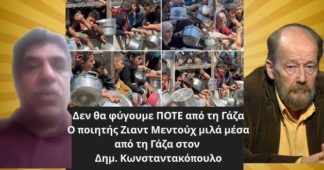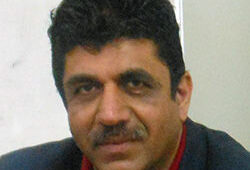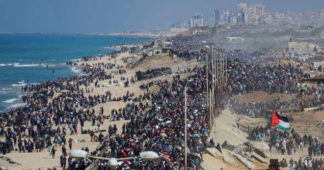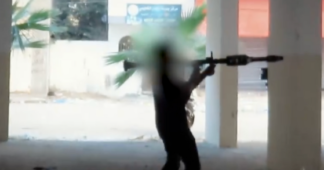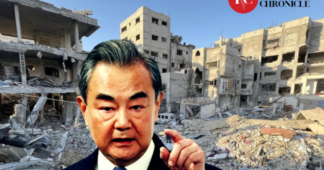The Palestinian poet and academic Ziad Medoukh speaks to Dim. Konstantakopoulos and militaire.gr.
The “Free Under Siege” of Palestine on militaire.gr.
“Believe me, my determination, my courage, my resistance, my patience, and my optimism cannot outweigh my absolute anguish… I struggle to believe I am still alive, for I see death a thousand times a day. And though I do not fear death, I worry for our future. The only positive aspect in all this—one that fills me with pride—is that I feel no hatred. Please accept the expression of friendship from the Palestinians of Gaza, which is no longer Gaza, and from Ziad, who is no longer Ziad.”
These words, among others, were part of a message sent last year from Gaza to his European friends (link: https://www.defenddemocracy.press/heartbreaking-testimony-from-ziad-medoukh/) by Palestinian Ziad Medoukh, a resident of this martyred city, who has fortunately survived and remains determined to stay on his land, alive or dead. Because, as he tells us, if I were to leave, I would be contributing to a second Nakba (the “Catastrophe” of the Palestinians—their initial expulsion in 1948 during the creation of the State of Israel, aimed at establishing a Jewish majority—see https://en.wikipedia.org/wiki/Nakba).
Glory to the peoples who count intellectuals and spiritual guides like Ziad among them. The future belongs to them, no matter what happens between now and then.
We sought him out in Gaza, where Christ is crucified once again, to give this people—directly, without intermediaries—the voice they have earned through their blood and unspeakable suffering, so they may tell us how they live, what they feel, and what they think. Whatever one’s opinion on the Palestinian issue—though at this stage, only the blind, the deaf, and those without dignity could fail to see that Israel’s so-called “anti-terrorist operation” has turned into genocide—it is essential to listen to and see the real people, something Greek and international media do not do, as they misinform rather than inform us.
Ziad holds a Ph.D. from Paris VIII University and heads the French Studies Department at Al-Aqsa University in Gaza, where in 2004 he founded the Gaza Peace Center, inspired by Gandhi’s ideas. He has launched numerous social initiatives, such as aiding local farmers and providing psychological support to children growing up under relentless bombardment. He is the author of several books, the most recent of which, published this year in French, is titled “Gaza, My Life Under the Bombs” (https://www.amazon.com/GAZA-MA-VIE-SOUS-BOMBES/dp/2931166235), along with countless poetry collections and studies on the evolution of Palestinian society. He has been honored with three international awards for his poetic work.
“We Palestinians have lost everything,” Ziad tells us. “Our land, our homes, our families, our loved ones, our possessions, our olive trees. “All we have left is hope. It is hope that keeps us going. He describes how Palestinian families and society have formed an unbreakable bond in order to resist the daily horrors they face.
While he expresses gratitude to protesters worldwide, he does not hide his disappointment with governments and the world’s powerful, who could stop the genocide yet choose not to, ignoring their moral, political, and legal obligations under the Genocide Convention of Geneva. Just as he condemns the media’s attitude in downplaying the scale of atrocities in Palestine.
The interview took place on May 21. In the three days that followed, as deaths—mostly of children and the elderly—from starvation multiplied, Britain, France, and Canada condemned the massacre, while the mainstream Western press finally, after twenty months (!), began calling things by their name. However, we are still just talking and not taking action. And it seems European leaders are only seeking to absolve themselves of responsibility for the greatest crime against humanity since the Nazis. But they have delayed too long. History will judge them no more kindly than Pontius Pilate if they do not act decisively, even now.
To conclude this brief introduction, let us note that the events in Gaza hold significance not only locally or regionally, but globally. In an insightful article, Thomas Fazi (https://www.defenddemocracy.press/gaza-the-us-and-china-the-future-of-war-and-the-end-of-civilisation/) explains why Gaza is a laboratory for revising the moral rules that still officially govern U.S. military policy—and for testing the use of massive violence against civilians as a weapon of war, which could tomorrow be used against China—while probing the limits of Western public opinion’s reactions to such methods.
Yet the question is even broader. How can the majority of states tolerate—some even supporting it with arms deliveries—such a genocide unfolding before the world’s eyes? How, eighty years after the defeat of Nazism, can its ideas and methods resurface with impunity? How is it possible that the Jewish people themselves are following a path that their own experience—and all of human history—should have taught them leads ultimately to their own ruin?
This is no longer just about the Palestinians of Gaza or the West Bank. It is about the future of our civilization, the future of humanity.
Good evening, my dear Ziad. I’m glad I can talk to someone based in the heart of these dramatic events which we all know and which appeal to our universal consciousness. I would like to ask you, first of all now that you live in Gaza, what does this really mean? What is life like in Gaza right now?
Good evening, Dimitris. Good evening to everyone who can see you and hear you. Thanks for the invitation. To answer your question directly. Life in Gaza today is not life. It’s survival. We are surviving, we are not living in Gaza. Survival in Gaza means to suffer the unbearable. To suffer daily. To try to find even a gram of hope for young people and children. Everyday life is very difficult. It is characterized by five elements. The first is the constant bombings, day and night, that leave many dead and injured, mainly civilians – children and women. The total destruction of any public infrastructure. Wells, universities, schools, houses, the internet network, the power grid. The third element is forced displacement. About 75% of Palestinians of Gaza were forced to evacuate the devastated neighborhood and their destroyed house and they remain in torn and damaged tents in inhumane conditions. The fourth element is hunger. The lack of food, as well as the lack of medicine, and the lack of drinking water. The fifth element is the absence of prospects. Fear, anxiety, worry, the uncertainty and the waiting. Waiting for a political solution. In general, it is difficult to describe and narrate the painful events of an entire Palestinian people isolated, abandoned and excluded But we are trying to hold on tight. It’s hard in these inhumane conditions prevailing in Gaza but we are trying. So, generally speaking, being Palestinian in Gaza today means waiting for your death at any moment. Death may come at any time. No one is unscathed. The bombs are falling on civilians day and night. We can say that after each pretty difficult day we wake up very early in the morning to search for food, to find water and fire, to drink and cook, to find a place where there are photovoltaics to charge lamps, mobile phones – because there is no electricity. Everything has been destroyed in Gaza. Some Palestinians remain who are trying to endure. Therefore, our daily life in Gaza today it is completely destroyed.
In which neighborhood, what city do you live in exactly?
I live in the west of Gaza City. My house was destroyed on December 2, 2023. They forced me into displacement from a neighborhood completely leveled to another simply damaged. This is our everyday life. A very difficult everyday life. But I never gave up the city of Gaza. I left the neighborhood when the tanks came, but I never left the city of Gaza. I always live in the city.
But, you could, I mean if you wanted, you could leave Gaza. What makes you stay there?
Should we leave Gaza, to go where?
Go to Europe, for example. You have excellent relationships with the French world. Therefore, I think that…
From the beginning of this attack, I decided to stay, not to leave. It’s hard. I’m a role model for young people and children. Therefore, it is difficult to leave Gaza because I don’t want to participate to a new Nakba. It’s hard for me to give up the Gaza Strip for now. It’s hard for me, and it is a matter of principle.
Despite the looming threat of death…
We have no other choice. Look, everyone resists in their own way. There is a civil society which is very organized in Gaza. I belong to it too. Civil society is the future of Palestine. Therefore, beyond political parties, civil society plays a very important role in today’s society. That is why civil society consists of women, young people, intellectuals who do an excellent job in the absence of political parties and under these conditions there is a very strong solidarity, both in social as well as at the family level. And that’s why we are a role model for the population. We can’t leave Gaza to death and destruction. Like I said, no one is unscathed. We are threatened, we may die at any time, but our duty is to stay here, tied to our lands, even if it means staying next to the ruins of our homes, the ruins of the our destroyed neighborhoods; it’s a matter of principle. I am a person who resists without using violence. That’s how I resist. Staying on my land. It’s part of my principles. Being a witness of this absolute horror. It’s part of my principles. That’s why I can’t leave Gaza despite the absolute horror, the suffering, the dangers, the threats, the hunger. But this is our way to say “no” to the occupying forces, “no” to violence, “no” to absolute horror. It’s our path, it is our resilience, and fortunately, there are tens of thousands, even hundreds of thousands of Palestinians, I would think, who chose this path. Because the goal of the occupying forces is to expel the Palestinians from Gaza. And to retake Gaza, to colonize it; but we must, despite the difficulties, stay here, in Gaza.
But Mr Netanyahu seems determined to go to the extremes. Either to completely destroy you, or force you in exile. Which will be the end of this story? What is your assessment?
From October 7, 2023 we suffer. Therefore, the threat of the occupation forces is nothing new. It’s nothing new to us, we endure. We continue to suffer the insufferable, but we are still here. This new plan then of conquest of Gaza, the reconquering of Gaza and the persecution of Palestinian, all this is not new, it started years ago. But the will and resilience of civil society thwarted settlement plans of the occupying forces. I believe that is their goal: to break the will and the determination of the very united civil society. Before this attack, there had been several others, notably four major attacks: in 2009, 2012, 2014 and 2021. This last one was the most important in duration, victims and disaster. Then, there is an inhuman blockade imposed in 2006. 19 years before this attack. And yet, the population decided to stay and not leave the land. The bloody attacks, the massacres, the crimes, they aim to expel the Palestinians. And yet, the Palestinians, 19 months after these attacks, and massacres, are still here. That’s why the occupying forces want to take revenge on the population, crush it. They want to exterminate them, but the Palestinians are still here. I am one of the Palestinians who decided to stay. We don’t know yet what will happen in the coming days. But, for now, we’re still here, to say no to every plan aiming to expel the inhabitants from the Gaza Strip.
Did you loose family members during these…
Yes. I lost my brother, his wife and their five children during the bombings at my house on December 2, 2023. And I lost 32 people of my extended family. Cousins, uncles, aunts. This is happening. to every Palestinian family; so, there is no freedom without price, without sacrifice. Therefore, I belong to these Palestinians. In every household, home, family, there are dead, injured, prisoners, those taken ill… This is the situation today of the Palestinians in Gaza.
You told me there is a food problem. What exactly is the situation now? I mean, how do people. . Do they find basic food to eat?
Listen. There is a strong adaptation. From October 7, 2023, passages have been completely closed. From October 2023 until January 2025, during 15 months of attacks, all passages were closed. However, there was international pressure and some trucks were passing by. We were forced to eat greens that grow north of Gaza because we were surrounded. There was no international organization, not one association, so, we were in complete poverty and we ate grass to survive. Now, for about 80 days, from March 2, 2025, there has been a complete blockade and nothing happens. No water, no medicine, no food, nothing. Consequently, there is real hunger. 67 Palestinians lost their lives from sheer malnutrition. That’s the first reason. And among those dead there are at least 34 children under nine years old, who suffered from malnutrition and hunger. This shows how much we suffer. Today, we adapt. We eat one simple meal instead of three. The meal includes pasta, rice and some canned food. And it’s very expensive. Imagine that a kilo of rice today costs 75 euros. A kilo of sugar costs 80 euros. A kilo of flour costs 100 euros. It’s unthinkable. The prices are incredible, but we are forced to adapt to a very difficult context, a situation of blocade, and closed borders and most of all lack of pressure from the international community. That’s the problem. The Palestinians of Gaza, even if they appreciate solidarity movements all over the world — I think that in Greece too there have been several demonstrations, friends sent me photos and videos… This shows that the Palestinian issue has international appeal.
Last Sunday was it 1,000,000 people who demonstrated in London, for example. It was an enormous demonstration.
– There were 200,000 people in London and in The Hague about 120,000. The problem is that we want to pressure the international community. The official international community. That is, the UN, the Security Council, Europe, the USA, the Arab League. Which unfortunately do nothing to denounce the atrocities that the Palestinians are suffering. We are dying of hunger and no one cares about our fate. That’s why the Palestinians feel abandoned.
Yes, but you know, public opinion in European countries, in the USA has been mobilized to support the Palestinians… or at least has opposed to these atrocities. But I have the impression that we too live in a kind of dictatorship, more or less, a covert one, where public opinion has less and less weight. Or if you want, there are lobbies which are powerful and which prevent governments from doing anything.
I was saying that unfortunately it seems that we live in a kind of virtual democracy where public opinion doesn’t play a big role in government decisions — or the pro-Israeli lobbies are very strong and they prevent governments from doing anything.
-But I also see…
-Unfortunately.
I also see that the Arab world is not mobilizing either. Or at least it doesn’t mobilize enough.
That’s the problem. There is no international pressure; even the words “condemn” or “shame” the leaders of Western and Arab states, seem unable to utter them, in order to characterize these crimes. They don’t even dare to use the words “genocide”, “crime”, “massacre”, “attack”. We have two problems. We have a problem with countries, the governments, including the Arab countries, and a problem with the media. The major Western media that hide the reality and they don’t show it. Fortunately, there are alternative means of information, like yours, who are trying to highlight the true reality. Unfortunately, leaders and the media are in favor of the Israeli occupation and not in favor of justice. Their complicit silence was a factor aggravating the situation. Imagine for yourself the last 20 months. For about 60 days now, there are civilians, childrem — imagine 19,000 children so far. There are 54,000 victims, including 19,000 children and 13,000 women. That is, 75% of the victims [are children and women]. There is no hospital in Gaza. There are only a few medical centers, some clinics. There is no medication. There is no life. Unemployment reaches 98%. There is a shortage of everything. Unfortunately, no one is taking action. That’s the point. We feel abandoned. This impunity encourages the [Istaeli] far-right government to continue these bloody attacks on civilians in Gaza.
Do you have any idea about the number of dead… because we know the official number of 53,000 dead… but I guess this number… It’s probably a little unrealistic. Because there are people whose fate we do not know, there are also those who died indirectly, due to lack of medical supplies, care etc. What is your assessment about the actual number of the victims of this attack?
These numbers are announced from the Ministry of Health in Ramallah by the Palestinian Authority. Because the Palestinian Authority, despite its absence, deals with these two issues. Education and health. Therefore, the numbers are disclosed from the Ministry of Health of the Palestinian Authority in Ramallah and by international organizations present. These are temporary numbers, as you said. We announced the number of the 54,000 dead and 120,000 injured. But, with the end of the attack, we will find that there are at least 100,000 dead. Because there are 15,000 people under the rubble. There are the dead in the prisons of the occupying forces, the bodies that were seized by the occupying forces. There are people who are dying of hunger, people who have died but are not restituted to the families. We know that the dead reach 54,000 because those came to the hospitals, in health centers and because their families announced their death, funeral or loss. However, there are dead people under the rubble, dead people who didn’t reach hospitals, dead in the streets, dead under the rubble. Approximately, this number reaches 100,000 dead in these 19 months of this heinous attack. Yes.
You said that there are almost no more hospitals in Gaza. That is, if there are seriously ill people, where can they go?
There are health centers and clinics. Apart from those dying of hunger there are others, like the chronically ill. We can say that there are 11,000 people who died in the last 20 months either due to lack of medical care… There are diseases that are chronic, like cancer and other serious illnesses which did not receive medical treatment. Because the occupying forces, when they attack hospitals, they destroy them completely. So, there are no beds left, no medical material, no equipment. That’s why there are so many dead. The number reaches 11,000. The dead on the lists reach 40,000, because in Gaza there are only medical centers and clinics overflowing with people. If I get sick, I will have to wait. in line for three or four hours to see a doctor. Doctors are “choking”. . because they have to treat 200-300 incidents a day. And when I get to the pharmacy, there is nothing left, because, due to the blocade, medication can’t cross the borders. And in the few pharmacies that exist, as medicines are hard to find, if I need for example a syrup for my chest or for a cough, I will have to pay 60-70 euros for a bottle of syrup which is not even 50 ml. And this is to show you what exactly is going on. Therefore, there is a collapse of the health system, due to the destruction of hospitals, due to entry ban on medical equipment, and of course mainly because many doctors were murdered and a large part of the medical staff can’t work because they are afraid for their families and because they can’t go to work in hospitals. Therefore, the situation is dramatic in the health sector which has collapsed in the Gaza Strip.
I suppose this situation is particularly difficult for children.
Children are the first victims of this attack. Me and my colleagues, we work with children, either in training centers, or we do various activities for psychological support. We noticed that the children are the first victims. We have five categories of children. We have the children who were direct victims of the attacks, that is up to 19,000 who are dead. We have 30,000 injured children who are not being treated. We have the children who suffer from malnutrition. We have the newborns who were born with a deficiency in breast milk and food and who don’t survive. We have children who suffer from psychological problems and wake up at night. There are children who suffer every day, who were forced to leave school and stay here due to forced displacement. This is everyday suffering for these children. The most dramatic aspect, leaving the dead apart, is the psychological factor. We observed through the activities that the children are psychologically traumatized. Even we, adults, are already traumatised. Imagine 20 months of bombing, the fear, the anxiety, the worry, the hunger, the collapse of the health system. It is normal to arrive in such complicated situations.
Yes, of course. There are still schools operating in Gaza?
Talking about the educational system: from October 2023 until October 2024, the entire school year was lost, because of the bombings and forced displacements and because 300 schools were destroyed. And the schools that weren’t destroyed were converted into reception centers for the displaced. So, there are no schools. Universities in Gaza were completely destroyed. Therefore, they do not exist. So, an entire academic year was lost. for pupils and students. From October 2024, civil society, academics and intellectuals decided to start the classes again. For the children. Either in educational centers, or in training tents which were put up to continue the lessons and not let another year go to waste. As far as universities are concerned, we created online courses with the help of colleagues from the West Bank, Europe or other Arab countries. We created online courses. Therefore, since October 2024, the lessons continue. We can say that 80% of students continue their lessons in educational centers. and in educational tents with physical presence. And 85% of students continue their lessons via the internet. With many difficulties though, because in educational centers there are no desks or chairs. And there are bombings and displacements and many students and teachers have been killed. Regarding university courses, things are the same. There is no internet, no electricity, or the network is slow. So, the situation is dramatic. But, there is the will, mainly on the part of families who send their children to school and in educational centers, and with the parents’ eagerness to encourage their children to go to school we managed to save the second year in schools and universities.
This shows a remarkable spirit of resistance.
Look, education… Education is resistance without the use of violence. Education is at stake for the Palestinians; this is a sign of hope. Because, despite the destruction of schools, of universities… we continue the lessons, we adapt and we are trying to find alternative means to avoid losing education; which means hope, and the future.
No doubt you’ve already told me about this, but I need to insist: What are the feelings of the average Palestinian? How does he react to these situations? What is he waiting for? Why does he insist on resisting peacefully? There are others who do not resist peacefully. Why does he continue this resistance? What motivates him?
A Palestinian in Gaza today is full of conflicting emotions. Mainly the civilians. The first feelings are anxiety, fear, worry, anticipation. These are negative emotions. It makes sense. After 20 months of continuously increasing attacks, deaths and destruction, injuries and nightmares, it is normal to have such feelings. Then, there is the feeling of waiting. Palestinians are always waiting a political solution. They are tired of the violence, the assault. And they cling to any hope. Trump’s statements, statements for talks to be held, for a truce, even a fragile one. They want to get out of this situation. And then there is hope. Today the Palestinians live with hope. The Palestinians have lost everything. Their land, their homes, their families, their relatives. They have lost their property, their olives, but they still have hope. And that’s why they cling to hope. They are following the situation. That’s why, despite their difficult financial situation, the first thing they buy is internet cards. To have an internet connection. To have an internet connection you used to pay 20 euros. Today we pay 500 euros per month to have an internet connection. Because there are no cables and the network is overloaded. But the Palestinians borrow, ask for money or use their economies not to eat or get dressed, but mainly to see what’s happening in the world. They really appreciate the demonstrations. In Athens, in London, in The Hague. Everywhere. In Paris. They want to see that there is some mobilization internationally for their cause. And secondly, to monitor the events and learn new things from international and Arab media, to find out wethwr talks are taking place or not, if the international community puts pressure, if a truce is in sight. That’s why the Palestinians are hooked by hope. Only thanks to hope do Palestinians exist today.
We see today that Israel despite what is happening is decided to continue to treat you not as befits humans, but as animals that must be exterminated. An Israeli politician, as I read somewhere today talked about the Israeli hobby of killing children. What is your opinion? Do you see an end to this story? You already gave me a rather negative report.
We believe that Israel takes advantage of impunity. Complete impunity. Nobody is putting pressure on it. Nobody condemns it, no one is complaining about it. That’s why its government acts like a monarch. After 20 months, while there are lots of statements, no actions are taken. The Palestinians are waiting for something specific. Look. Statements were made. President Trump called for a stop to this war. Very good statement. In politics, words are very important. President Macron said that what the Israelis are doing in Palestine is a shame. European leaders are complaining. Yes, words are very important in politics, but we are waiting for something tangible. And what is needed is to exert pressure on the Israelis internationally. All statements, all words leave them indifferent, as well as UN statements or resolutions of the Security Council. How many decisions are there? From 1948 to the present? There are hundreds of international decisions, protesting, calling for withdrawal, but to date nothing has been done. We are talking about complete impunity, for example, on the issue of weapons. No one dares in a European country or in America say: “We will stop selling weapons to the occupying forces”. Economic sanctions? Nobody. Look. Against Iran, Iraq, Syria, Russia, sanctions were imposed, both economic and military. But, nothing against the Israeli occupation. Against this occupation, against the Far-Right government, which continues to murder both directly and indirectly the Palestinians of the Strip of Gaza, that is, civilians. No one dares to say to Israel to stop. Nobody says “Enough”. Nobody says “It’s unacceptable. “This situation can’t continue.” There are statements, but nothing specific. I’ll cite as an example sports participation. The occupying forces are participating in every sporting and artistic organization in Europe. Europe does not have the courage to say “no” and stop their participation. There is an association agreement between Israel and the European Union. So far there are no threats to halt or cancel this agreement. The products of illegal Israeli settlements are sold duty-free in European countries and benefit from the very good customs prices in relation to local products. So, there is impunity, there is encouragement, and, most importantly, there are no sanctions. As long as there are no sanctions, the occupying forces will continue the colonization and their aggressive policy against the Palestinians.
Thank you very much, Ziad, for the time you dedicated to our interview. Above all, thank you for your fight, which I consider a fight for the future of world culture and not just for Palestine and the Palestinians. What you do is very important. for the whole world. Thank you very much and I hope we can put pressure on our government. Thank you very much.
I hope so too. See you again.
See you again. Goodbye.
